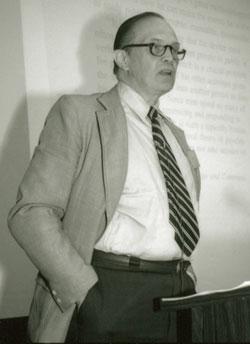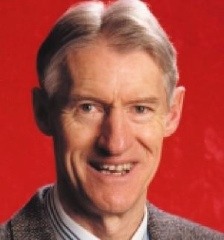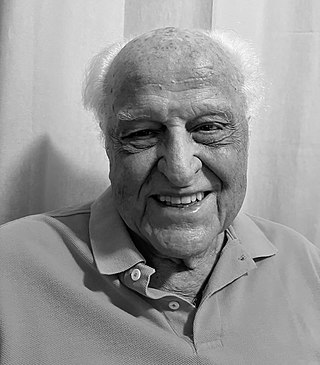Related Research Articles

Behavioral economics studies the effects of psychological, cognitive, emotional, cultural and social factors in the decisions of individuals or institutions, and how these decisions deviate from those implied by classical economic theory.

George Armitage Miller was an American psychologist who was one of the founders of cognitive psychology, and more broadly, of cognitive science. He also contributed to the birth of psycholinguistics. Miller wrote several books and directed the development of WordNet, an online word-linkage database usable by computer programs. He authored the paper, "The Magical Number Seven, Plus or Minus Two," in which he observed that many different experimental findings considered together reveal the presence of an average limit of seven for human short-term memory capacity. This paper is frequently cited by psychologists and in the wider culture. Miller won numerous awards, including the National Medal of Science.
The British Psychological Society (BPS) is a representative body for psychologists and psychology in the United Kingdom.

Anatol Rapoport was an American mathematical psychologist. He contributed to general systems theory, to mathematical biology and to the mathematical modeling of social interaction and stochastic models of contagion.

Mathematical psychology is an approach to psychological research that is based on mathematical modeling of perceptual, thought, cognitive and motor processes, and on the establishment of law-like rules that relate quantifiable stimulus characteristics with quantifiable behavior. The mathematical approach is used with the goal of deriving hypotheses that are more exact and thus yield stricter empirical validations. There are five major research areas in mathematical psychology: learning and memory, perception and psychophysics, choice and decision-making, language and thinking, and measurement and scaling.

[[File:|thumb|Michael Argyle]] Michael Argyle was one of the best known English social psychologists of the twentieth century. He spent most of his career at the University of Oxford, and worked on numerous topics. Throughout his career, he showed strong preferences for experimental methods in social psychology, having little time for alternative approaches such as discourse analysis.

Quantitative psychology is a field of scientific study that focuses on the mathematical modeling, research design and methodology, and statistical analysis of psychological processes. It includes tests and other devices for measuring cognitive abilities. Quantitative psychologists develop and analyze a wide variety of research methods, including those of psychometrics, a field concerned with the theory and technique of psychological measurement.
Lee Joseph Cronbach was an American educational psychologist who made contributions to psychological testing and measurement. At the University of Illinois, Urbana, Cronbach produced many of his works: the "Alpha" paper, as well as an essay titled The Two Disciplines of Scientific Psychology, in the American Psychologist magazine in 1957, where he discussed his thoughts on the increasing divergence between the fields of experimental psychology and correlational psychology.
John Robert Anderson is a Canadian-born American psychologist. He is currently professor of Psychology and Computer Science at Carnegie Mellon University.
Gordon Howard Bower was a cognitive psychologist studying human memory, language comprehension, emotion, and behavior modification. He received his Ph.D. in learning theory from Yale University in 1959. He held the A. R. Lang Emeritus Professorship at Stanford University. In addition to his research, Bower also was a notable adviser to numerous students, including John R. Anderson, Lawrence W. Barsalou, Lera Boroditsky, Keith Holyoak, Stephen Kosslyn, Alan Lesgold, Mark A. Gluck, and Robert Sternberg, among others.

Robert Allen Bjork is Distinguished Professor of Psychology at the University of California, Los Angeles. His research focuses on human learning and memory and on the implications of the science of learning for instruction and training. He is the creator of the directed forgetting paradigm. He was elected a member of the National Academy of Sciences in 2022.
William Kaye Estes was an American psychologist. A Review of General Psychology survey, published in 2002, ranked Estes as the 77th most cited psychologist of the 20th century. In order to develop a statistical explanation for the learning phenomena, William Kaye Estes developed the Stimulus Sampling Theory in 1950 which suggested that a stimulus-response association is learned on a single trial; however, the learning process is continuous and consists of the accumulation of distinct stimulus-response pairings.
Richard Shiffrin is an American psychologist, professor of cognitive science in the Department of Psychological and Brain Sciences at Indiana University, Bloomington. Shiffrin has contributed a number of theories of attention and memory to the field of psychology. He co-authored the Atkinson–Shiffrin model of memory in 1968 with Richard Atkinson, who was his academic adviser at the time. In 1977, he published a theory of attention with Walter Schneider. With Jeroen G.W. Raaijmakers in 1980, Shiffrin published the Search of Associative Memory (SAM) model, which has served as the standard model of recall for cognitive psychologists well into the 2000s. He extended the SAM model with the Retrieving Effectively From Memory (REM) model in 1997 with Mark Steyvers.

David LaBerge is a neuropsychologist specializing in the attention process and the role of apical dendrites in cognition and consciousness.
James Tarlton Townsend is a Distinguished Rudy Professor of Psychology at Indiana University, Bloomington. He is known for his work in mathematical psychology, particularly in distinguishing parallel and serial processing and for models of perception.
Richard J. Crisp is an author, blogger, scientist and Professor of Psychology at Durham University. He is co-originator of the imagined contact hypothesis and a major contributor to the field of social psychology.
Gordon Logan is the Centennial Professor of Psychology at Vanderbilt University. A cognitive and mathematical psychologist, Logan is well known for his work on cognitive control and inhibition of cognitive and motor activity, divided attention and the nature of the human brain’s processing limitations, and the fundamental characterization of attention deficit hyperactivity disorder ADHD. He has also done extensive research on the hierarchical control of skilled copytyping, which he views as a useful model for hierarchically organized complex human skills in general. He collaborates on research that applies mathematical models to neural and behavioral data.
Aimable Robert Jonckheere, commonly known by friends and colleagues as "Jonck", was a psychologist and statistician at University College London (UCL). He is probably best known for his work in nonparametric statistics, where he has a test named after him: Jonckheere's trend test.
Jerome Robert Busemeyer is a Distinguished Professor at Indiana University Bloomington in the Department of Psychological & Brain Sciences and Cognitive Science Program.
Robert Maclaughlin Farr was a social psychologist from Northern Ireland who played an important role in promoting and developing social representation theory.
References
- ↑ Audley, Robert J. (1956). Stochastic processes and the description of learning behaviour in choice situations (Ph.D.). University of London.
- ↑ Harvey, Nigel (2020). "Robert (Bob) Audley 1928-2020". The Psychologist.
- ↑ Audley, Robert (1970). "Choosing". Bulletin of the British Psychological Society. 23: 177–191.
- ↑ "Bob Audley Interview". Cubistular. Retrieved 26 August 2020.
- ↑ Audley, Robert (1960). "A stochastic model for individual choice behaviour". Psychological Review. 67: 1–15. doi:10.1037/h0046438. PMID 13795057.
- ↑ Audley, Robert (1965). "Some alternative models of choice". British Journal of Mathematical and Statistical Psychology. 18: 207–225. doi:10.1111/j.2044-8317.1965.tb00342.x.
- ↑ "Experimental Psychology". Publications Archive.
- ↑ "Past Presidents". British Psychological Society. Retrieved 27 August 2020.